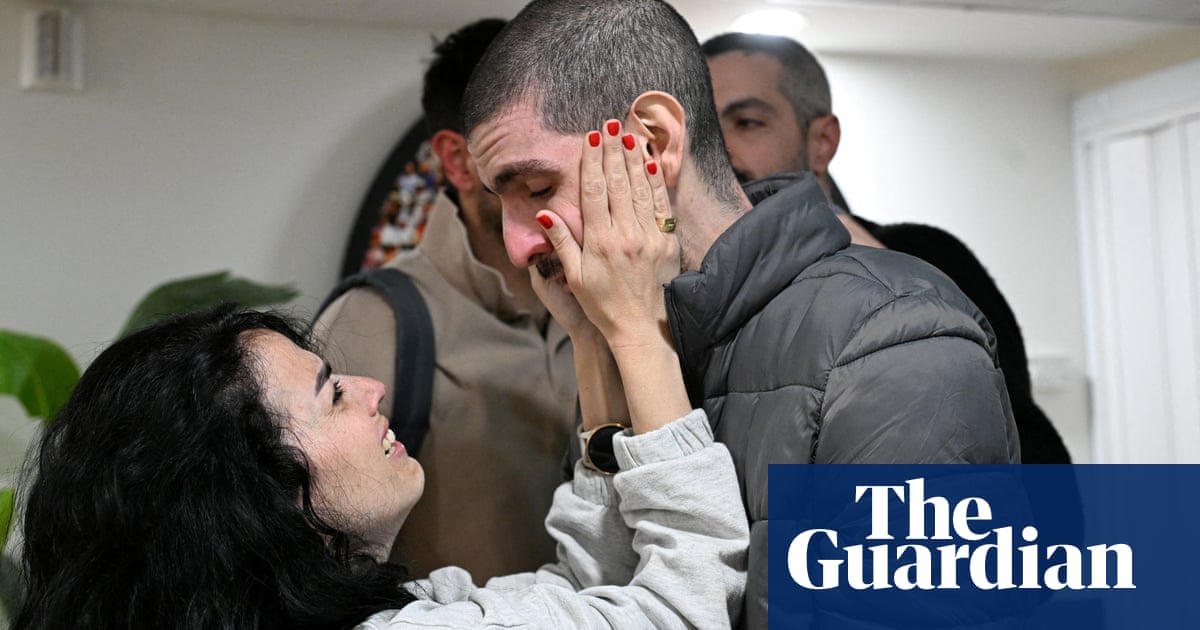 |
|
The fifth prisoner exchange between Israel and Hamas, part of a fragile ceasefire agreement following the October 7th, 2023, Hamas attack on Israel, concluded with the release of three Israeli hostages. While celebrated by many in Israel, the visibly frail and disoriented condition of the returning hostages sparked widespread concern amongst their families and the Israeli government. Images from the handover ceremony in Deir al-Balah, Gaza, depicting the emaciated hostages flanked by masked Hamas militants, elicited strong reactions, with Israeli Prime Minister Benjamin Netanyahu's office describing the scenes as 'shocking' and President Isaac Herzog condemning the cruel spectacle. The contrast between the jubilant crowds in Tel Aviv watching live footage and the stark reality of the hostages' condition highlighted the complexities and human cost of the ongoing conflict. The event served as a stark reminder of the suffering endured by the hostages during their captivity. The emotional toll on the families, having witnessed the deterioration of their loved ones' health, was palpable, underscoring the deep human impact of the conflict.
Simultaneously, 183 Palestinian prisoners were released by Israel as part of the exchange. The Palestinian Prisoners’ Club, an advocacy group, reported that seven of these prisoners required immediate hospitalization due to alleged mistreatment and brutality while in Israeli custody. This claim of abuse, echoing long-standing accusations of human rights violations within the Israeli prison system, fueled further tensions and accusations against Israel. Hamas, the governing authority in Gaza, formally accused Israel of employing a policy of 'slow killing' of Palestinian prisoners, further escalating the rhetoric surrounding the prisoner swap. The starkly contrasting narratives surrounding the treatment of prisoners from both sides highlight the deeply entrenched mistrust and animosity that continues to fuel the Israeli-Palestinian conflict. The differing accounts of the events and the conditions in which the prisoners were held raise questions about the conditions of captivity, the need for independent investigation, and the overall humanitarian implications of the prolonged conflict.
The fifth exchange takes place amidst ongoing negotiations for a more permanent ceasefire between Israel and Hamas. The immediate focus is on the next phase of the ceasefire, which aims to secure the release of the remaining hostages held in Gaza. Although talks were scheduled to begin on Monday following the exchange, there is a palpable sense of uncertainty regarding the success of these negotiations. The involvement of international mediators, including Qatar, Egypt, and the United States, underscores the international significance of the conflict and the desire for a lasting resolution. However, the deeply rooted issues fueling the conflict – including land disputes, the blockade of Gaza, and the broader Israeli-Palestinian conflict – present significant obstacles to achieving a lasting peace. The deeply entrenched historical grievances and political complexities make any progress towards a sustainable peace agreement a monumental task.
President Donald Trump's controversial statement suggesting the US should take over and clear out the Gaza Strip generated widespread global condemnation. His remarks, which disregarded the complex humanitarian and political dimensions of the conflict, further exacerbated tensions and underscored the precarious nature of the ongoing peace talks. The strong global reaction to Trump's statement highlights the widespread international concern over the conflict and the need for a diplomatic, rather than a militaristic, solution. The statement served as a reminder of the delicate balance required to maintain international cooperation and the potential for inflammatory rhetoric to derail already fragile peace negotiations. The continuing conflict and the need for a resolution necessitate a careful consideration of the perspectives of all parties involved and the avoidance of actions that could further escalate tensions and exacerbate the humanitarian crisis.
The October 2023 Hamas attack, which resulted in the deaths of over 1,200 people in Israel according to AFP tallies, primarily civilians, set the stage for the current crisis and the subsequent prisoner exchanges. Israel's retaliatory actions have, according to the Hamas-run territory's health ministry, resulted in the deaths of at least 48,181 people in Gaza, the majority civilians. The United Nations considers these figures reliable. These devastating casualty numbers underscore the immense human cost of the conflict and the urgent need to find a peaceful resolution that prevents further loss of life and suffering. The scale of the violence has raised questions about accountability, international humanitarian law, and the need for a comprehensive investigation into the conduct of both sides during the conflict. The figures paint a grim picture, calling for a swift and decisive end to the violence and the implementation of measures to prevent future tragedies of a similar scale.
The release of five Thai hostages the previous week, who were subsequently discharged from hospital and returned to their home country, offered a small measure of relief amidst the overall tension. Their release, however, only served to highlight the remaining challenges in securing the release of all hostages and achieving a lasting ceasefire agreement. The case of the Thai hostages serves as a reminder of the international dimension of the conflict, and the need for international collaboration to ensure the safety and return of citizens caught up in the conflict. The ongoing uncertainty and the remaining hostages serve as a sobering reminder of the complexities and challenges that lie ahead in reaching a just and sustainable resolution to the Israeli-Palestinian conflict.
Source: Israel and Hamas complete fifth hostage-prisoner swap
